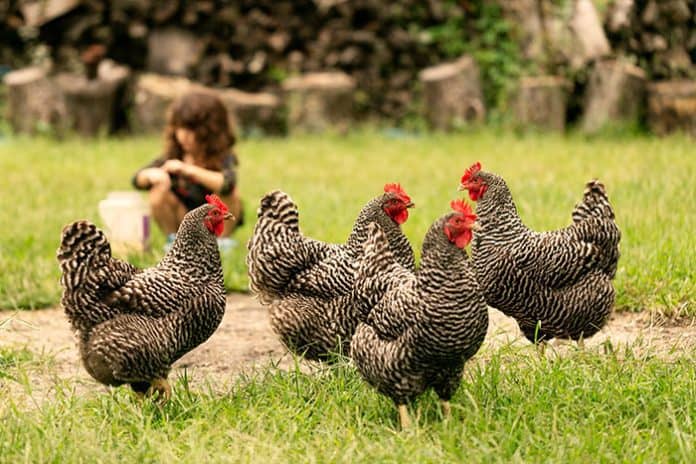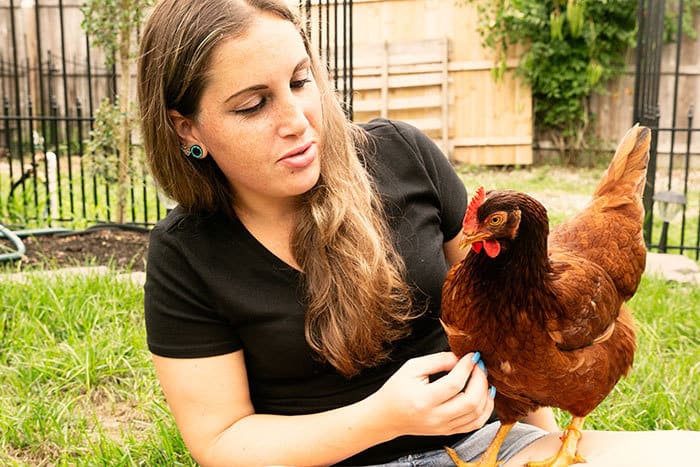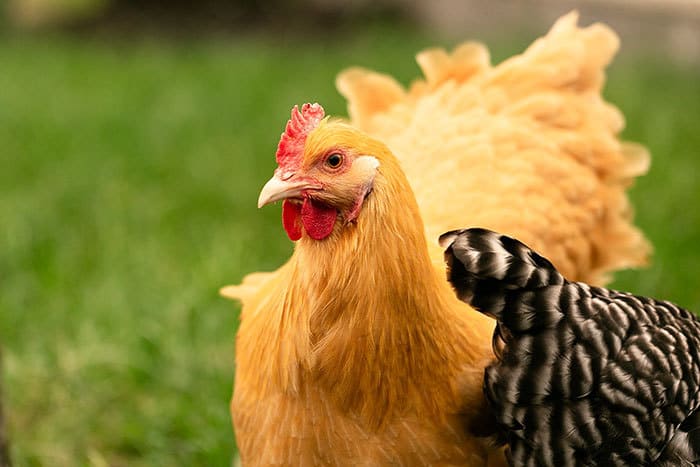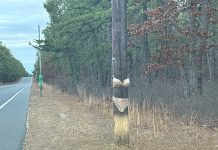
LAKEHURST – You see it first through the gaps in the stockade fencing, a dazzle of black and white stripes with a shock of red that wouldn’t come up to an adult’s kneecap. There’s movement, but there might not be a precise verb to describe this walk. As you approach, you hear the clucking. Low, a whisper.
Alana Scott’s backyard at her Willow Street residence is home to her brood of Barred Rocks hens, a type of Plymouth Rock chicken ideal for backyard poultry. This breed boasts good egg layers with friendly temperaments who tolerate the cold well, according to MyPetChicken.com. While they’re bribed to location by Scott and her 4-year-old daughter Teagan with potato chip crumbs – a rare treat – they stay clear of the stranger (the reporter) in their backyard.
Cats have their meows to demand food or a neck scratch. Chickens cluck. “They’re clucky…they’ll yell at you to get your attention,” Scott said.
She’s had the chickens for about four years, having inherited four of them and adding three more. All hens, all nameless. Scott’s son Charlie, 14, a ninth-grader at Manchester Township High School and on the autism spectrum, is responsible for caring for them: feeding them, cleaning their coop nestled in the corner of the yard.
“I’ve always wanted chickens. They’ve enhanced our lives, they give us eggs,” Scott said. “You get food out of it!”
Crossing the road, Willow Street neighbor Kristine Naia has had her chickens for more than a year. Their coop is nestled in the very back of Naia’s landscaped property. A family member had to rehome the birds. Naia took them in.
“I absolutely love them. Before I had chickens, I thought they were a dumb, brainless bird and they didn’t have any personalities,” Naia said. “At the end of the day, after work, I’ll go in the backyard and sit with them for an hour or two.”

‘You’re chicken’ isn’t an ungrounded expression: the chickens were terrified of Naia when they moved onto her property. The surroundings, the sounds, the humans, were all unfamiliar, even to those bird brains. But one day, “One of them, on her own, decided that one day she would jump on my lap on my chair. As time passed by, I got to know them, and they’re a lot like dogs. They’ll come running to me when I call them, they like to jump up and be pet.”
Some of the hens arrived monikered, others christened upon adoption: Lucy and Ethel, Nickel, Penny, Copper, Goldie Hen, Tammy Wyandotte and Dolly ParHen, Bonnie, Scarlett O’Henna, Beaker, Morticia, Crimson, Kahlúa, and Smoke. Their breeds are as varied as their names: the backyard favorite Barred Rocks, Silver and Gold-Laced Wyandottes, Easter Eggers, Rhode Island Red, Black Australorp, Buff Orpington and Silkies mixes.
Some of the hens are young and hardy, good layers. Others lay occasionally, and as they age, will likely stop laying. They yield enough eggs for not only Naia’s extended family, but also her boyfriend’s mother and brother. The birds will thrive and pass peaceably without becoming dinner roast, long past their laying years.
Aside from a few scuffles and one hen believing she’s a rooster, Naia sits, legs pretzeled, on the grass, and tosses bird feed to her pecking, contented, quiet brood.
Ordinance Being Reviewed
The social media buzz was this: the airship capital of the world has also allegedly been home to ponies, goats, pigeons, horses, even pigs. Lakehurst, of course, is today a suburban borough, that sprouted in the midst of farming country that transformed into townships. However, remains of the past farming communities can be seen throughout the county. But today, if anyone has anything more exotic than chickens in Lakehurst, they don’t have social media, or decided they didn’t want to bring attention to themselves by contacting The Manchester Times for this article.
Urban and suburban homesteading has been on the upswing for years now (you know it’s mainstream when it appears in the pages of The New York Times and the airwaves of National Public Radio, not exactly fringe news organizations). These homesteaders take what space they have and cultivate gardens, cure their own cold processed, hand-cut soaps, and raise their own animals – chickens and even honey bees. They know exactly what’s on and in their lettuce and tomatoes, their hand soap, their eggs and honey, so they know exactly what’s going in and on their bodies. For others, it’s simply about the joy of the work. The cost for feed, for lard, for seed, the work, is worth it.
Lakehurst’s animal ordinances haven’t been visited in at least 20 years, and only address dogs and cats, although Chapter V of the borough code alludes to the well treatment of animals “under control” by an owner. It’s an issue Council President Steve Oglesby recognized, and is working to address. He assured one concerned citizen at the last council meeting that no, the borough had no plans to prohibit breeds of dog, but to continue to address individually recognized vicious dogs, for which an ordinance already exists.
The horse is seemingly out of the barn when it comes to chickens. Only cats and dogs need to be licensed in the borough; it’s generally unknown how many homes in Lakehurst have chickens, or bees, or pigs.
Oglesby couldn’t provide any specifics of what he’ll propose to Council, as he’s still researching the issue.
“I am still in the research phase, exploring various options. Primary objective, without being too heavy handed about it, is avoiding health hazards and ensuring that quiet enjoyment aspect,” he wrote in a Sept. 13 email to The Manchester Times. So questions about potential registration, limits on the number of animals, property requirements, whether animals will be grandfathered in, etc., remain questions for now.
Each municipality has its own unique character, its own set of quirks and challenges and laws. What works in Toms River won’t work in Lakewood won’t work in Pine Beach won’t work in Eagleswood. For instance, in Waretown, a resident can keep a domesticated monkey – which the ordinance doesn’t even address – but can’t keep carnivorous, undomesticated large mammals or reptiles. Think lions, tigers, Komodo dragons. You can probably own those zoo animals in Jackson, but unfortunately, only if you’re licensed as a zoo, which brings with it yards of red tape. Swine are heavily regulated in Jackson, Waretown, and Howell, but not even mentioned in Berkeley and must live on at least five acre lots in Brick Township.
As with other animals that aren’t cats and dogs, municipalities may have an ordinance governing them, or they may not. Some have ordinances about chickens, some do not. (On first glance, it appears none have ordinances about keeping honey bees.)

When it comes to governments regulating suburban chickens, Gwenne Baile has lots to say. She’s the chairwoman of Camden County Chickens and Therapy Hens and is responsible for helping to craft local ordinances about keeping chickens in suburban settings. She considers her municipality’s ordinance – Haddon Township – the gold standard.
“One of the things that works best on both sides, if they’re coming up with legislation, is to mandate a class in raising backyard chickens in the suburbs,” Baile said. “The reason for that is to not only make sure that the policies are good for the chickens, because obviously their welfare is very important to us, but because we know that, especially doing this in the suburbs, which is what I have almost all of my background in, that we need to be very aware of our neighbors.”
Baile, who charges a nominal fee for her classes, educates those interested in raising chickens in three main areas: how to raise chickens in suburbia without a rooster; how to keep chickens healthy, free from cross-contamination; and how to build a chicken coop and run that is predator-proof. Throw away that cheap chicken wire; it won’t keep anything out.
Baile has already done all the research. She urged Lakehurst and other towns considering an ordinance to know this: it’s not the size of the lot that matters.
“The most important thing, and it’s for two reasons, is, how far away your entire chicken complex is – their coop and their run – from the neighbor’s windows and doors of your contiguous neighbors?” Baile said. Most municipalities have come somewhere between 20-25 feet, without issue. At 20 feet, most reasonable neighbors won’t be bothered by the clucking of a few hens. “And, if you keep your coop and your run clean, your neighbors aren’t going to smell it. Those are the two biggest issues neighbors are going to complain about: the noise and the smell.”
In the last six months, Lakehurst Police Officer Robert Schroeck said the department had a report of a rooster call keeping neighbors awake at night. (They’ll cockadoodledoo at all hours, not just to announce the sunrise, which is why Baile is against keeping them in backyard broods.) The department is aware of a house in the borough that keeps chickens, but otherwise, to his knowledge, has received no complaints.






